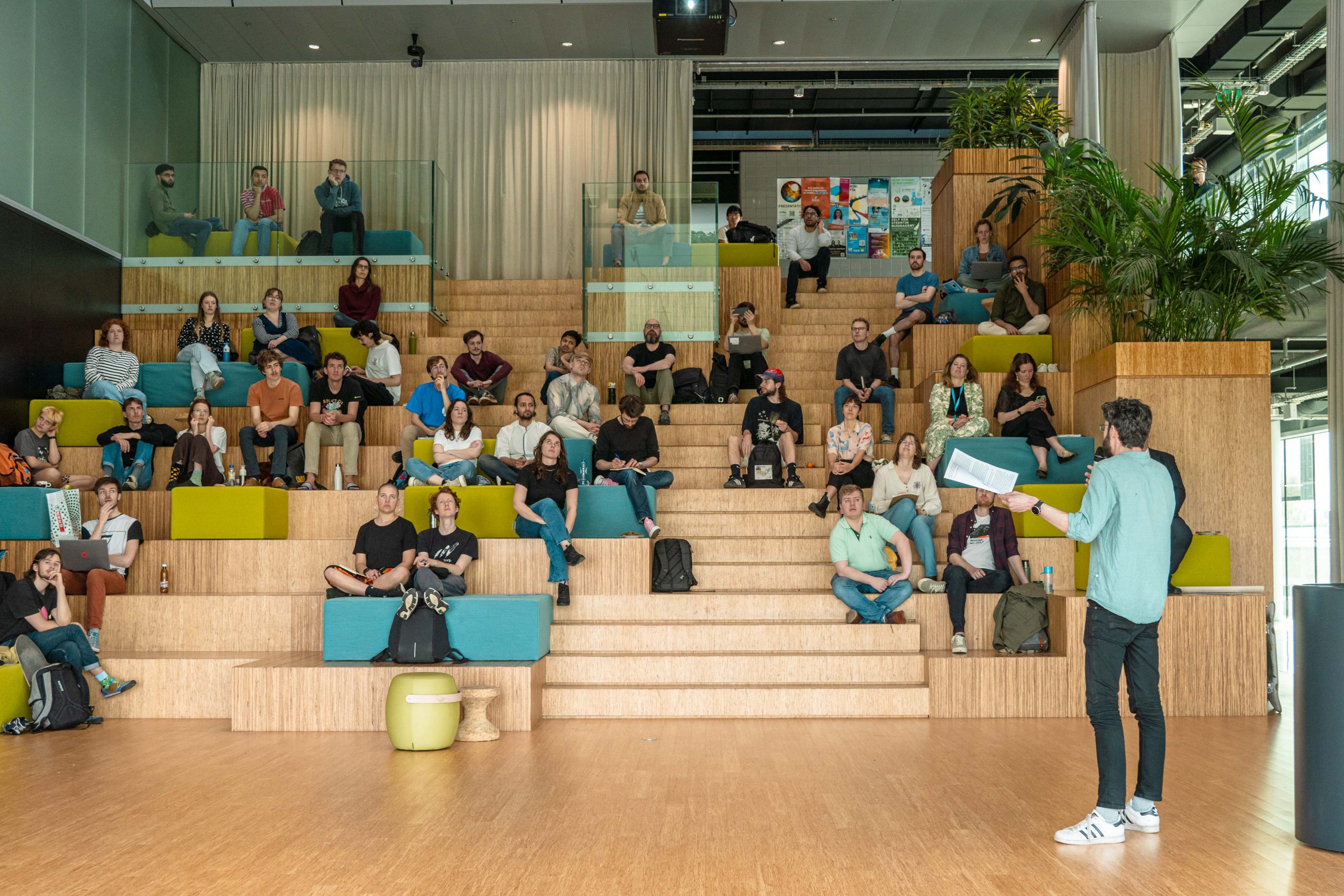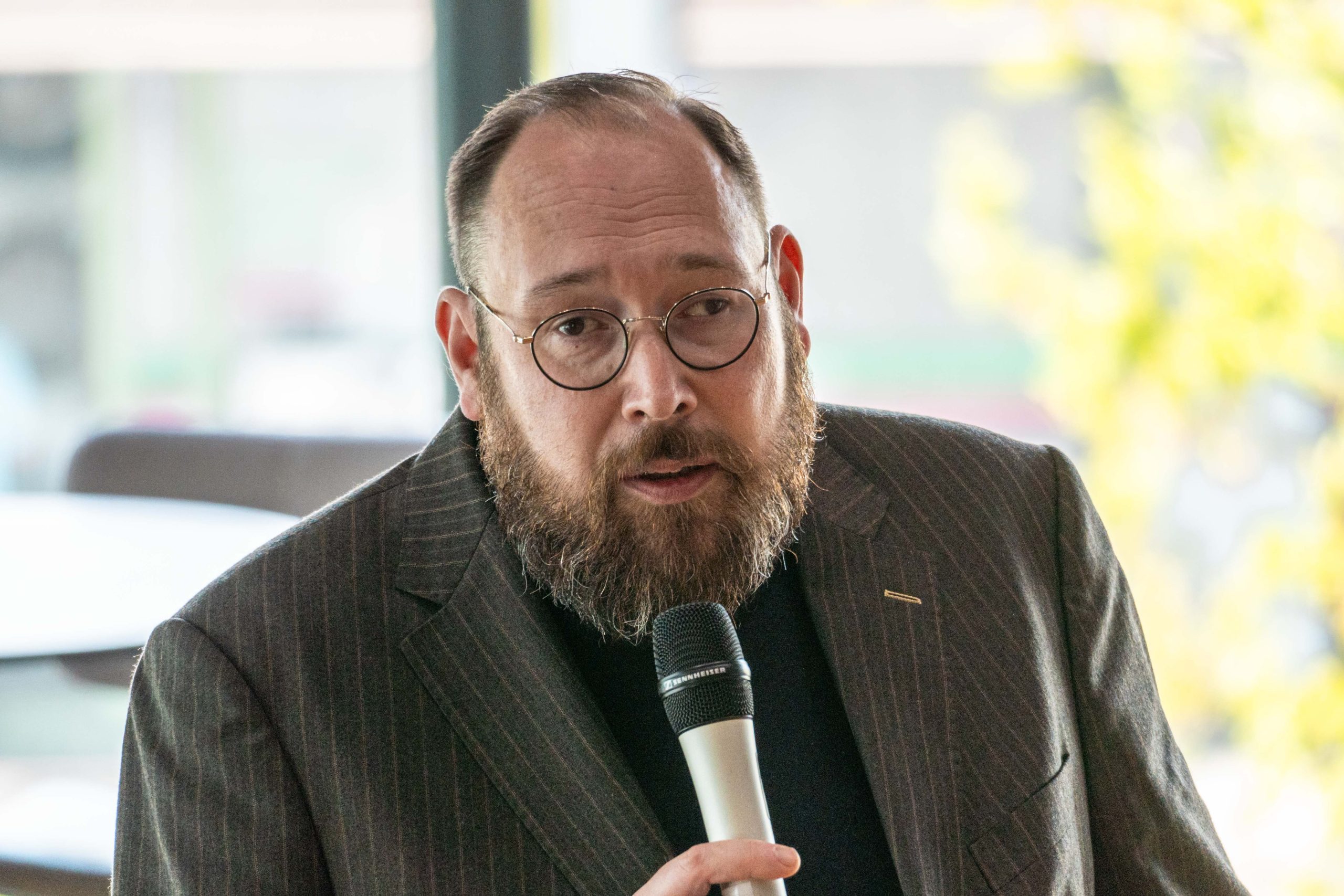At the Democracy Day organised by students on Wednesday 1 May, staff members and students discussed how TU Delft could be governed differently. “We do not have to accept the situation as it is now.”
During Democracy Day, students and staff exchanged ideas on better governance of the university. (Photo: Thijs van Reeuwijk)
The organisers of the Democracy Day enticed the public to come to the top floor of Pulse with chocolate chip cookies, vegan Oreos, and gluten-free stroopwafels (caramel syrup waffles). Flyers in which the management model at TU Delft is described are spread around the seating area.
How this model could be different is the main question of this meeting, which is held in English. This Democracy Day will be the first of many meetings where students and staff members discuss the decision-making process at TU Delft. One of the organisers, Tom Twigt, who recently graduated, opens the event by saying that the students who organised the event want to show that TU Delft can be managed differently. “We do not have to accept the situation as it is now .”
In the audience, when the microphone does a first round along the few dozen people present, Delta columnist Bob van Vliet summarises the situation. “It now looks as if there is one boss that decides everything and the only way that you can exert any influence is if you influence the boss.”
A lot of protest
The presentation by Abel Streefland, TU Delft’s university historian, immediately shows that this was not always the case. Not only did TU Delft have several names in the past, but the administration models changed regularly.
‘Activism is almost as old as the institution itself’
At the end of the 1960s, it took several protests to change the previous model that had no participation procedures, to a different way of administering. The ideal democracy was put down on paper, but in practice, it preceded a period of a loss of control and many protests and occupations, says Streefland. Its current form, in which an Executive Board takes the decisions and the Works Council and Student Council primarily have an advisory role, came about after a change in the law in 1997.
Streefland shows that protests preceded all these changes. “Activism is almost as old as the institution itself.” He believes that an engaged community is the first step towards a more democratic university. “We need to move towards building an engaged community in which everyone again feels that their voice counts.”

In the same boat
Remco Breuker, Professor of Korean Studies at Leiden University, also emphasises that community is key. He is perhaps better known as a member of the WO in Actie (higher education in action) group, one of whose activities is promoting democracy. He is able to express his ideas, says Breuker, because as a professor he is high up in the hierarchy. Others who wish to speak out walk a fine line if they criticise something. Speaking out in a group offers protection, he says.
‘Large parts of universities are now more hierarchical than they used to be’
He has followed the situation at TU Delft over the last few months with “empathy, bewilderment and recognition”, he continues. “It is different than at Leiden, but at the same time similar. We are all in the same boat.” The Professor believes that one important cause is the excessive hierarchy. This was not always the case, stresses Breuker. “Large parts of universities are now more hierarchical than they used to be.”
Mud
Much of the power that professors used to have has now shifted upwards to higher levels of administration. To the Executive Board that ‘is surrounded by a moat’ – a metaphor for the bureaucratic layers around the management. Breuker says that this is intimidating and creates a situation in which the Executive Board itself no longer knows exactly what everyone at a given university does. In this situation, how can you govern properly?
While some people want to see universities operate like companies, Breuker says that their societal and academic tasks make them very different. “Above all, they are places where independent research and education are carried out in academic freedom.” He calls on everyone to do this. “We can only change TU Delft in large numbers.”

- Also read the interview with Remco Breuker that Delta published last year: Chop TU Delft into pieces like an earthworm
Under fire
After Breuker’s talk, the audience has the opportunity to ask questions to the members of the Works Council and the Student Council. They come under fire from several people in the audience. Do they still have confidence in the Executive Board? Are you free to say anything if you are in the Works Council or the Student Council? Are the representation bodies sufficiently visible? “We are venting our frustrations with the Executive Board on you”, says one attendee.
Student Council member Sam de Jong (Lijst Bèta) replies saying “It’s like we are debating with each other. Just remember that we are on the same side.” Student Council member Koos Meesters (Dé Partij) pointed out that obtaining just 10 signatures allows you to start a student party. “Then you really can do something about democracy instead of just talking about it.”
Less power for the Executive Board
The attention then shifted. The audience slowly moved the target away from the representation bodies’ members and started a discussion on ideas for a better form of governance than the current one. Less power in the hands of the Executive Board is repeatedly said. And open elections for new administrators instead of appointment by the Supervisory Board. Can the representation bodies not elect a new Executive Board member? And the Works Council and the Student Council should be a lot more visible so that students and staff members see that their voices count. The organisers write suggestions on a whiteboard.
‘We want to get the discussion going from the bottom up’
The afternoon is “the start of the dialogue”, says one of the organisers, rounding off the event. “You do not solve power relations top down. We want to get the discussion going bottom up and involve as many people as we can.”
Twigt looks back on a ‘successful afternoon with plenty of interesting ideas and good discussions’, he emails Delta afterwards. The follow-up, which will be a series of lunch lectures with experts, is being arranged.
The role of Delta
The relevance of Delta as an independent university media outlet was mentioned several times during the Democracy Day event. QR codes to Delta’s articles about the management at TU Delft were included at the back of the flyers that were distributed.
Abel Streefland, TU Delft’s historian, believes that Delta could be a means to enhance engagement. Going through the archives, he has seen a change in the tone of articles. “In the 1970s and 1980s the paper was full of news and opinion pieces. After that, the politics faded more and more into the background.”
Breuker too stresses the importance of independent media. Because of Delta, “what was happening at TU Delft was brought to light” he said in his reading. He believes that this media channel is “the canary in the coalmine”. An attack on the TU Delft university paper is an attack on us all.”



Comments are closed.